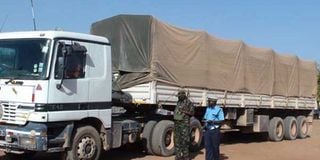Police release three Somalia-bound trucks, WFP says

Police officers inspect one of three trucks belonging to the World Food Programme (WFP) that were held over allegations of supplying food to Al-Shabaab on February 2, 2016. The WFP says the trucks have been released. PHOTO | MANASE OTSIALO | NATION MEDIA GROUP
What you need to know:
- The WFP did not explain the circumstances under which the trucks would be released.
- The UN agency had said the vehicles had actually been stopped over security fears, and not because they were supplying goods to the militants.
The World Food Programme (WFP) on Wednesday announced Kenyan authorities have allowed its trucks to proceed into Somalia, a day after Mandera police seized them over suspicion that they were ferrying supplies to Al-Shabaab.
WFP Senior Regional Spokeswoman Challiss McDonough told the Nation that a "misunderstanding" between the agency and the government had been resolved.
“The county commissioner has released the trucks, so they will be able to move on to our warehouse in Dolo carrying lifesaving food assistance for the poorest and most vulnerable Somalis,” she said even as the two sides were still holed up in a meeting in Mandera.
On Tuesday, Mandera County Commissioner Frederick Shisia told reporters he had barred three trucks belonging to the agency from transporting humanitarian goods to Somalia because he had reports the goods would reach Al-Shabaab.
Early on Wednesday, the UN agency had said the vehicles had actually been stopped over security fears, and not because they were supplying goods to the militants.
“The reporters may have misinterpreted what the county commissioner actually said, because he has communicated to us that the security of the convoy itself could not be guaranteed,” Ms McDonough said.
The WFP said it was delivering aid to Dolo, a region under the control of African Union Mission to Somalia (Amisom) troops and where it has had a regional office for years.
The agency said it has a strong “monitoring” team on the ground to ensure no diversion of aid happens.
The permission for the trucks to proceed to Somalia could dissolve possible tension between humanitarian agencies and the government over whether the aid intended for displaced people in Somalia has been benefiting Al-Shabaab.
AL-SHABAAB
This is not the first time the WFP has been accused of diverting humanitarian aid. In 2010, a UN monitoring group for Somalia and Eritrea said half of its food supply was diverted. The agency denied the allegation.
In 2012, the UK Department for International Development argued that part of aid to Somalia worth Sh77 million had been confiscated by Al-Shabaab.
In 2010, the WFP was banned from Al-Shabaab-controlled territories in what the militants argued was the agency's failure to pay "taxes" of about $20,000 every six months, spying on the group and employing women.
Experts in relief law say negotiating with terrorists or rebels is a lesser evil, if it is the only way of guaranteeing the safety of humanitarian workers and ensuring supplies reach those most affected by conflict.
“Normally, the interest of the humanitarian organisations is that aid should reach those most in need. They will therefore make every effort to reach these people whether they are in regions controlled by those labelled as insurgents, rebels, terrorists or not,” Mr John Wamwara, a humanitarian law lecturer at Moi University, told the Nation on Wednesday.
“International humanitarian law provides that humanitarian organisations, providing impartial humanitarian assistance, may offer their services in armed-conflict situations. The only condition is that this assistance must be impartial,” he added.





